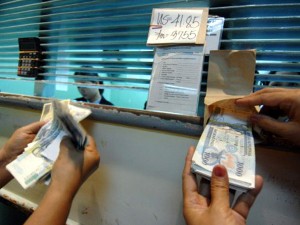
REMITTANCES STILL UP Customers count Philippine peso at a moneychanger in Manila in this 2007 file photo. Cash remittances from overseas Filipinos reached $13.02 in the eight months to August 2011, up 6.9 percent from the same period last year. Remittances by Filipinos abroad are a key driver of growth for the Philippine economy. AFP PHOTO/ROMEO GACAD
Overseas Filipinos sent home $13.02 billion in the eight months to August, up 6.9 percent from a year ago, the Bangko Sentral ng Pilipinas reported yesterday.
The central bank said that notwithstanding global economic uncertainties, remittances continued to be solid and resilient, supported by sustained demand for Filipinos abroad.
Remittances in August amounted to $1.67 billion, rising 11.1 percent from $1.5 billion in the same month last year. This was the fastest pace of growth in 18 months.
Major sources of remittances in the first eight months of the year were the United States, Canada, Saudi Arabia, the United Kingdom, Japan, Singapore, the United Arab Emirates, Italy, Germany and Norway. Combined remittances from these countries accounted for nearly 85 percent of the total money sent home by Filipinos abroad.
The central bank said it expected remittances from overseas Filipinos, which fuel domestic consumption and support the peso and the balance of payments, to continue to grow despite the anticipated slowdown in overall economic growth.
Earlier this month, the government cut its growth forecast for this year to between 4.5 percent and 5.5 percent from a previous estimate of 5 to 6 percent with weakening trade and a faltering global economy. It also cut its 2012 growth forecast.
Remittances for the whole of 2010 reached a record $18.76 billion, up 8.2 percent from a year earlier. The country is one of the world’s top five recipients of remittances.
The central bank has said it was reviewing its forecast of a 7 percent growth in remittances this year, but it has indicated that any change may not be great.
Citing reports from the Philippine Overseas Employment Administration, Bangko Sentral Governor Amando Tetangco Jr. said job orders for Filipino workers by employers abroad hit 193,176 in the first nine months of this year, an increase of 8.6 percent from 177,936 in the same period a year ago.
“Going forward, the remittance outlook for the remaining months of the year remains favorable as government redeployment strategies are in place to help Filipino workers affected by the social unrest in the Middle East and North Africa region,” he added.
He said concerned government agencies are working to have more labor markets for Filipinos who wish to work abroad to compensate for the employment drag caused by the crisis in the Middle East and North Africa region.—With a report from Reuters

